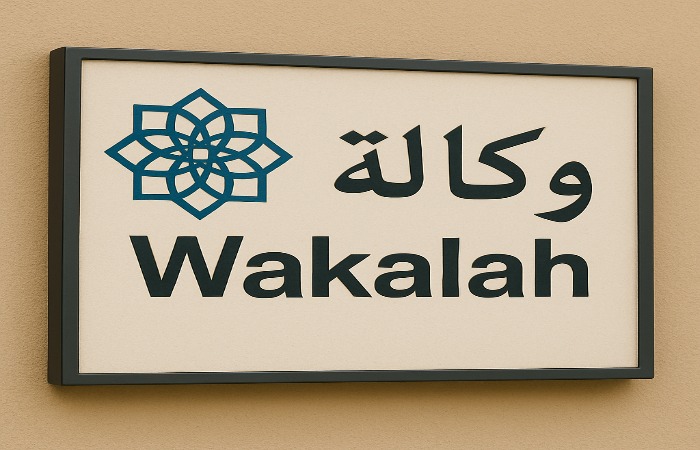Understanding Wakalah in Islamic Finance
Introduction: Meaning of Wakalah
Wakalah, derived from the Arabic root word 'wakl', means to entrust or to deputize. In Islamic law, it refers to an agency contract in which one party (the principal or 'muwakkil') appoints another party (the agent or 'wakil') to perform a task or represent them in matters that are permissible under Sharia. The agent acts on behalf of the principal either without compensation (voluntary wakalah) or with a fee (paid wakalah).
This concept is widely used in everyday Muslim life, whether in commercial transactions, legal representation, or personal affairs. Its flexibility and simplicity make it a powerful tool in Islamic contracts, allowing for the delegation of tasks while maintaining the ethical boundaries set by Islamic law.
Legitimacy and Principles of Wakalah
Wakalah is firmly grounded in Islamic jurisprudence. Its legitimacy is derived from the Quran, the Sunnah (Prophetic tradition), and scholarly consensus (ijma). It is also governed by clear principles that emphasize trust, transparency, and lawful conduct.
The Quran illustrates the permissibility of agency through the story of the Companions of the Cave. They appointed one of their group to purchase food on their behalf. This action demonstrates an early example of agency and delegation in Islamic tradition:
"So send one of you with this silver coin of yours to the town, and let him find out which is the good lawful food, and bring some of that to you. And let him be careful and let no man know of you." (Quran 18:19)
The Prophet Muhammad (peace be upon him) also endorsed and practiced wakalah. One notable hadith is narrated by Jabir ibn Abdullah (may Allah be pleased with him):
"I intended to go (on expedition) to Khaybar. So I came to the Holy Prophet (peace be upon him), greeted him and said: I intend to go to Khaybar. He said: When you come to my agent, you should take from him fifteen Wasqs (of dates). If he asks you for a sign, then place your hand on his collar-bone." (Abu Dawood, Book #24, Hadith #3625).
Key principles of Wakalah include:
- Mutual Consent: Both principal and agent must freely agree to the terms.
- Lawful and Known Subject Matter: The task delegated must be Sharia-compliant, well-defined, and known.
- Legal Competence: Both parties must be legally competent (i.e., of sound mind and age).
- Trust and Good Faith: The agent is expected to act sincerely and in the best interest of the principal.
Principles of Operation
The operational structure of Wakalah is rooted in the concept of amanah (trust), where the agent is entrusted with the rights and duties related to the assigned task. The relationship is fiduciary in nature, requiring the agent to act with due diligence, sincerity, and loyalty.
Scope of Authority: The agent may be given either general or specific authority. The agent may be given either general or specific authority. In modern settings, this is often documented through legal agreements or memorandums.
Remuneration and Fees: While Wakalah may be voluntary, it is often practiced as a paid service. The agent is compensated based on a mutually agreed fee. This fee cannot be based on a share of profits unless structured through a separate contract like mudarabah.
Accountability and Liability: The agent is responsible for acting within the terms of the agreement. If losses occur despite the agent’s honesty and competence, they are not liable. However, liability arises if the agent acts outside the contract’s limits, displays negligence, or breaches trust.
Use of Modern Tools: In contemporary practice, Wakalah may be implemented through digital platforms, power of attorney documents, or business agency mandates. This modernization helps apply the classical rules of Wakalah to modern commerce, investment, and banking.
Types of Wakalah
The classification of Wakalah allows for flexibility in its use across various domains. The types include:
- General Wakalah (Wakalah ‘Aammah): The agent is authorized to act broadly on the principal’s behalf without being confined to a specific task. Though convenient, it may entail risks if not carefully managed, hence some scholars discourage it unless supported by customary safeguards.
- Specific Wakalah (Wakalah Khassah): This is the most common form. The agent is limited to a well-defined task, such as purchasing a specific asset, collecting a debt, or representing someone in a legal proceeding.
- Restricted Wakalah (Muqayyadah): Here, the agent must follow detailed instructions. This structure is typical in financial services, where the client instructs a bank to perform actions like investing only in certain halal sectors.
- Unrestricted Wakalah (Mutlaqah): In this flexible form, the agent may use personal judgment while still acting within the spirit of the contract. It is useful when the principal is unable to supervise every detail.
- Commercial and Institutional Wakalah: Examples include banks acting as agents in trade finance, investment managers representing investors, and takaful operators managing participant funds. These forms are essential to modern Islamic financial operations.
- Fuduli (Unauthorized Agent): A person who acts as an agent without prior consent from the principal. The principal’s later ratification may validate the contract retroactively. This concept, mentioned in classical fiqh texts and the Majallah, ensures flexibility while protecting ownership rights.
Revocation and Termination of Wakalah
The Wakalah contract can be terminated through several mechanisms, depending on circumstances and contractual terms:
- Completion of Mandate: The agency naturally ends once the task has been completed.
- Revocation by the Principal: The principal may end the contract at will, provided it does not involve ongoing obligations or third-party rights.
- Withdrawal by the Agent: The agent may withdraw due to inability or hardship, but ideally with notice.
- Legal Incapacity or Death: The death or insanity of either party usually terminates the contract. However, if the Wakalah affects third-party rights or ongoing duties, the termination may be delayed until obligations are resolved.
- Change or Destruction of Subject Matter: If the subject matter of the contract is destroyed (e.g., a car meant to be sold is totaled), the agency ends automatically.
- Bankruptcy or Dissolution: If the principal or agent is declared bankrupt or the institution is liquidated, the Wakalah may terminate, unless third-party obligations exist.
The flexibility to revoke Wakalah reflects the non-binding nature of the contract (ghayr lazim), which prioritizes consent and ethical fairness.
Applications in Modern Islamic Finance
Wakalah is widely used across Islamic financial services to facilitate lawful agency relationships. These applications offer both operational efficiency and Sharia compliance:
- Investment Accounts: Banks manage funds on behalf of clients, acting as wakil. The customer sets investment preferences, and the bank earns a fee regardless of performance. This avoids the risk-sharing model of mudarabah but offers more predictability.
- Takaful (Islamic Insurance): Operators manage the risk pool as agents for participants. They charge a wakalah fee for managing the fund, separate from the risk-sharing component.
- Sukuk al-Wakalah: In this Islamic bond structure, the issuer (usually a special purpose vehicle) acts as an agent to manage a pool of assets on behalf of sukuk holders. The structure is popular for its transparency and clear roles.
- Trade Finance and Letters of Credit: Islamic banks open letters of credit on behalf of clients, paying suppliers and handling logistics. Here, the bank acts as an agent and may charge a fee for service.
- Real Estate and Asset Management: Investors appoint developers or financial institutions as agents to manage property portfolios, collect rents, or sell assets. Contracts typically include strict accountability clauses.
Wakalah’s prominence in Islamic finance highlights its adaptability, ethical framework, and legal clarity. Institutions appreciate it for its low-risk profile, while clients benefit from transparent service arrangements.
Conclusion
Wakalah remains one of the most trusted and versatile instruments in Islamic commercial and personal dealings. Its foundation in Sharia gives it legitimacy, while its flexibility ensures adaptability in both traditional and modern contexts.
The key strength of Wakalah lies in its simplicity and ethical basis. It facilitates representation and delegation without transferring ownership or introducing undue risk. From classical fiqh to contemporary Islamic finance, Wakalah provides a Sharia-compliant framework for managing tasks and responsibilities efficiently.
In the financial sector, Wakalah supports a wide array of products and services—ranging from investment accounts and sukuk to Takaful and trade finance. It ensures transparency by clearly defining roles and responsibilities, and it upholds ethical principles by emphasizing trust, accountability, and lawful conduct.










